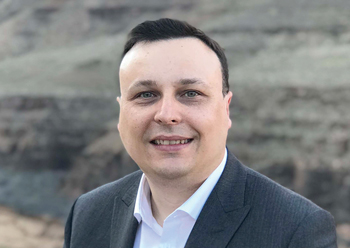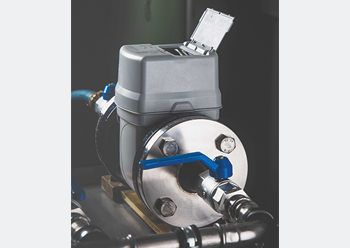Region seeks smart ways to save water
As the Middle East focuses on managing its water resources, smart water technologies point way to manage assets, improve lifecycle costs, operate efficiently and minimise water losses, says Sensus.
01 December 2019
Innovative technology by Sensus is positively impacting the region’s utility sector, which is experiencing a digital transformation, with governments increasingly focused on leveraging digital technologies, artificial intelligence (AI) and big data to achieve competitive advantage and manage precious water resources.
Amid growing pressure to do more with less, utilities are expected to invest $14 billion in smart water technologies through 2024 globally, mitigate unnecessary water losses and also optimise advanced asset management, the company’s Ian Sykes tells ABDULAZIZ KHATTAK of Gulf Construction magazine.
He says smart meters, in particular, play a significant role in delivering seamless automation, given their capacity to accurately track and quantify water usage, as well as offer other vital features such as real-time leak detection. By facilitating improved digital water capabilities, utility firms can reap the rewards in terms of operational excellence, improved revenue potential and more sustainable resource management.
 |
|
Sykes ... investment in smart water technologies to reach $14 billion by 2024. |
Across the GCC, governments and utilities are focused on making the shift from an outdated utility infrastructure towards smart digitalisation. Historically, less than five per cent of wastewater is ever treated and reused in the Middle East.
“However, this is set to change drastically. As part of the UAE’s Vision 2021, the government is leading renewed efforts to reuse 100 per cent of its wastewater by 2020,” says Sykes.
He says the water utility infrastructure challenge is not just about meeting the needs of a burgeoning urban population, but also creating smart utilities initiatives that will help achieve water security for the future.
“Hence to sum this, smart utilities have a major role to play in making the country ‘water smart’,” Sykes remarks.
In recent years, Sensus, a leading provider of smart technologies and services to utilities, has launched quite a few intelligent solutions that address the water industry’s most persistent problems. These advanced technologies and expertise enable it to better partner with customers to address their infrastructure pain points: NRW (non-revenue water), aging infrastructure, operational efficiency, water conservation, and improved life-cycle costs – while significantly enhancing the economics of their water and wastewater operations.
Smart water solutions, including physical equipment and treatment, wireless networks cloud analytics, mobile computing, powerful data modelling, and the internet of things (IoT) offer new ways to address the industry’s challenges and opportunities.
Sykes says these are not prototypes being tested in a laboratory, but are proven solutions that are already delivering dramatic improvements in water productivity, quality and resilience.
These intelligent solutions, he says, reduce energy consumption and costs, contribute to lower emissions, and improve operational efficiencies, all of which can help water managers better afford investments in clean water and wastewater infrastructure.
Most recently, Sensus launched its new bulk ultrasonic static water meter, Cordonel, which has been designed to help achieve a smarter utility network.
Sykes says the meter has been designed to help customers achieve higher levels of operational efficiency and productivity for their assets.
“Cordonel is a revolutionary innovation that will enable water utility networks to draw on rich real-time data for unprecedented insights on water usage. This will help users to achieve higher savings through the close monitoring of consumption patterns as well as the various patterns in the distribution network, and through Cordonel, we will support the region’s focus on sustainable development, especially in the management of water resources, with both supply and demand side insights,” he adds.
The Middle East, perhaps more so than any other region in the world, faces unique water challenges, water scarcity being one of the most important ones, says Sykes. To add to this, aging infrastructure could pose a bigger issue with water leaks in a network accounting for huge water losses.
“We are seeing that the region and specially in the UAE, Dubai Electricity and Water Authority (Dewa), is on the right track in addressing these issues whilst placing sustainability front and centre of the many goals set by the governments here.”
Sensus has been, for long, helping utilities in the Middle East and has a strong footprint in the region, where it supports major utility providers with advanced solutions that help reduce the downtime of mission-critical equipment. Its static meter offering for residential applications, including iPERL, which is deployed extensively in the region, has already achieved strong results.
With the introduction of Cordonel, Sensus is expanding its smart offering, which is set to benefit potential customers ranging from irrigation and landscape firms to water utilities, via building services, large commercial properties and industries.
Having been present in the Middle East for a number of decades, Sensus has had the opportunity to work with a number of utilities and governments across the GCC and wider region.
“We are seeing a number of big projects driving smart initiatives across the region that we are honoured to be able to support. For example, in Saudi Arabia where we’re seeing unprecedented transformation, we’ve been engaging with the Neon project. Across the GCC, we’re also continuing our work with leading utilities to help make their smart city initiatives a success.”
Sykes says in the Middle East, there is a renewed drive for localisation, with governments focused on achieving national visions and the region very much shining a spotlight on forward-thinking smart city initiatives.
In the UAE, the National Innovation Strategy – which targets making the UAE one of the most innovative nations in the world – and Smart Dubai 2021, which aims to move to a 100 per cent digital future, adopting smart water technologies within utilities, in my opinion, will help bring the nation closer towards achieving these goals, says Sykes.
“In addition, with sustainability being one of Expo 2020’s three sub-themes and one of the key pillars of the UAE’s Vision 2021, it has never been more imperative than now, to become water smart,” he states.
When it comes to technological disruption, Sykes says the water sector is an example of one area making strides in harnessing the power of AI to deliver ever-increasing efficiencies for the end-user, as well as leveraging data analytics to improve the uses of technology.
He says the development of intelligent infrastructures and automated systems not only allows utilities to monitor a wide range of assets in real time, creating many business efficiencies, but also enables the energy sector to tap into a more complete data set-up, including better sensors, cyber security protocols and supply chain optimisation.
Similarly, when it comes to IoT, the water sector is seen to be taking advantage of it for better consumption, management and distribution.
“An IoT-enabled smart water sensor can track quality, pressure, and temperature of water. In fact, a sensor solution can measure liquid flow,” says Sykes.
IoT can also play a role in leak detection and send an immediate alert warning the authorities, engineers and network managers on water wastage.



